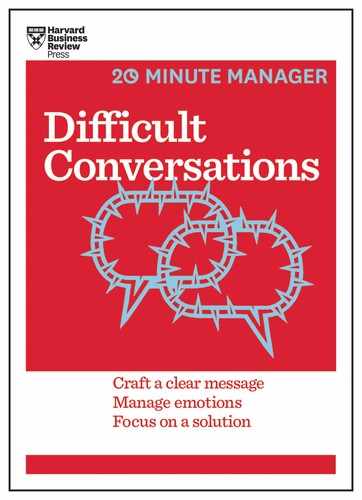acknowledgment, of other person, 51–52
action plans, 77–78. See also following up on difficult conversations
anger, 63–64. See also emotions
anxiety, 4–5. See also emotions
assessment
assumptions, assessing your, 33–35, 53
avoidance of difficult conversations, 3, 21–22
bad news, breaking, 21
commitments
common ground, identifying, 61–62, 66, 77
communication skills, developing, 12–13, 85–96
composure, maintaining, 62–63. See also conducting difficult conversations
conducting difficult conversations, 49–68
adapting and rebalancing during, 62–67
commitments, establishing, 67–68
common ground, identifying, 61–62, 66
counterpart, acknowledging, 51–52
starting approaches for, 45–46, 51–53
consistency, 89. See also trust
counterpart
acknowledging your, 51–52. See also conducting difficult conversations
considering perspective of, 37, 41. See also preparing for difficult conversations
emotions of, 37
looking for common ground with, 61–62
understanding your, 65
written follow-up with, 77–79. See also following up on difficult conversations
difficult conversations, overview, 3–13
emotional intelligence, and difficult conversations, 23–24, 86
emotions
during conversation, 76
of counterpart, 37
triggered by difficult conversations, 38–39
eye contact, 51. See also conducting difficult conversations
factors contributing to difficult conversations, 3–13
facts. See also perspectives
feedback
constructive, 19
loops, 93–95 feelings. See emotions
fight or flight response, 11. See also emotions
following up on difficult conversations, 71–81
keeping your commitments, 79–81
questions to ask post-discussion, 72–74
having a difficult conversation. See conducting difficult conversations
impasses, 65–66. See also conducting difficult conversations
impressions, notes about your, 74–77. See also following up on difficult conversations
initiative, taking, 27–28. See also preparing for difficult conversations
insecurities, 25, 26. See also perspectives
introspection, 17–28. See also preparing for difficult conversations
issues
focusing on, 56
“I” statements, 53–54. See also conducting difficult conversations
listening, 56–60, 77, 90–91. See also conducting difficult conversations
mind-set, changing your, 28. See also preparing for difficult conversations
misunderstandings, 64–65. See also conducting difficult conversations
mock conversations, 43. See also preparing for difficult conversations
neutral setting, 46. See also preparing for difficult conversations
note taking, 74–77. See also following up on difficult conversations
open communication, 91–92. See also communication skills, developing
outcomes of difficult conversations, identifying positive, 41–42
passive-aggressive behavior, 89. See also trust
personal connections, developing, 88–90
personal styles, 6–8, 25 perspectives
considering other person’s, 37, 41
preparing for difficult conversations, 31–46
acknowledging your role in the problem, 39–40
assessment of facts and assumptions, 33–35
deciding to have a conversation, 18–20
identifying positive outcomes, 41–42
strategy development in, 43–46
taking the initiative in, 27–28
thinking through the situation, 17–28
timing of the conversation, 46
problems
acknowledging your role in, 39–40
description of, 76
asking, 56–60. See also conducting difficult conversations
to ask post-discussion, 72–74. See also following up on difficult conversations
to prepare for conversations, 44. See also preparing for difficult conversations
reflection, before speaking, 86–88. See also preparing for difficult conversations
root causes of difficult conversations, 3–13
scripts, 43. See also preparing for difficult conversations
solutions, 67–68, 77. See also following up on difficult conversations
speaking
strategies, 43–46. See also preparing for difficult conversations
stubbornness, 65–66. See also conducting difficult conversations
succinctness, 93. See also communication skills, developing
taking action, 18–22. See also preparing for difficult conversations
timing, 46. See also preparing for difficult conversations
trust
building, 89
understanding difficult conversations, 3–13
work styles, 6–8, 9. See also root causes of difficult conversations
written follow-up, 77–79. See also following up on difficult conversations
